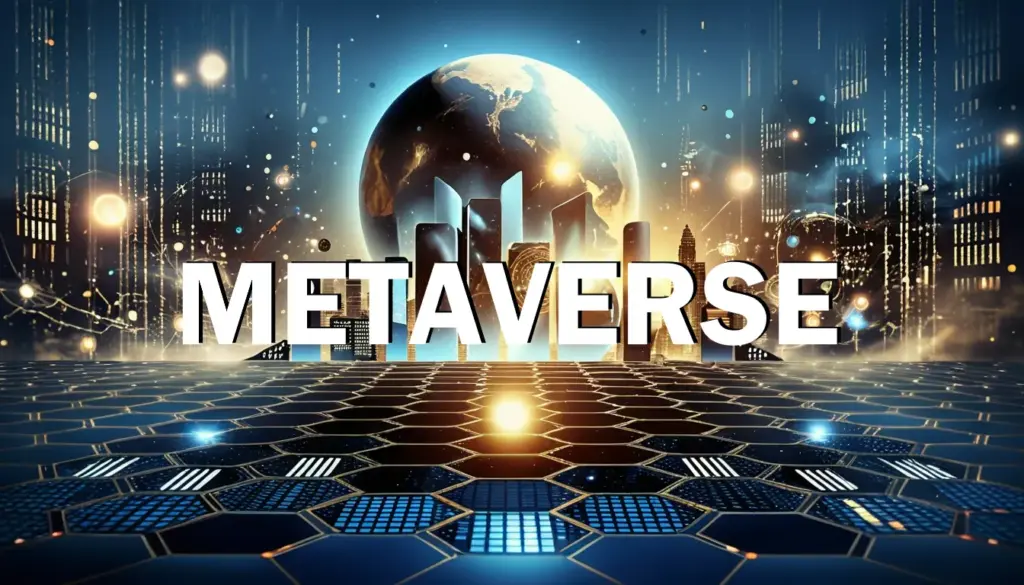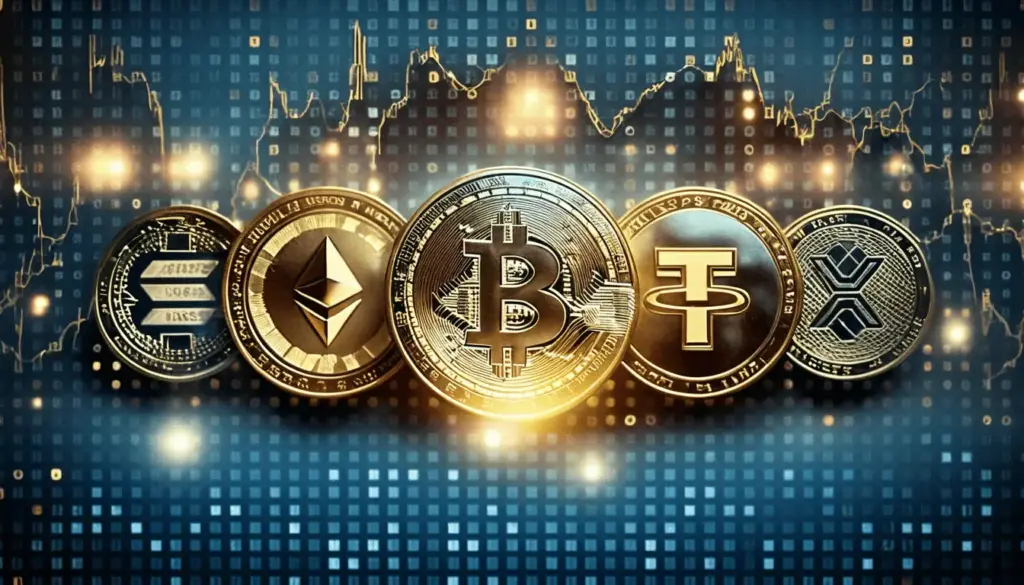As of 2025, the digital world is evolving at an unprecedented pace. We’re rapidly moving beyond smartphone screens into immersive digital realms – the metaverse – where social and economic activities mirror reality through Virtual Reality (VR) and Augmented Reality (AR) technologies. Within this monumental shift, blockchain-powered cryptocurrencies are emerging as the core engine of the metaverse economy, forging an entirely new digital economic ecosystem. This post will explore the transformative fusion of the metaverse and cryptocurrency and the future opportunities it presents.

The Metaverse: Blurring the Lines Between Virtual and Real
✅ Beyond Gaming: An Immersive Digital World
Initially perceived as primarily gaming and entertainment platforms, the metaverse is now expanding into diverse sectors like education, work, shopping, and social networking. Market research from firms like Statista and Grand View Research projects the global metaverse market to grow from approximately $100 billion in 2024 at an average annual rate exceeding 30%, potentially reaching between $700 billion and $1.3 trillion by 2030. This signifies a profound shift that will fundamentally alter how we live and conduct economic activities, transcending a mere tech trend.
✅ Key Metaverse Platforms and Use Cases
Several companies are developing innovative metaverse platforms, enhancing user experiences. Notable examples include:
- Roblox: A user-generated content (UGC) based gaming and social platform with significant influence, particularly among Generation Z. It utilizes its own digital currency, ‘Robux,’ to power its virtual economy.
- Zepeto: Operated by Naver Z (a subsidiary of Naver), this avatar-based social platform collaborates with fashion, entertainment, and other brands, cultivating new consumption patterns within the virtual space.
- The Sandbox: A blockchain-based metaverse platform enabling users to own virtual real estate (‘LAND’) as NFTs and monetize their created content.
- Decentraland: Another blockchain-based metaverse platform where users can participate in platform governance and decision-making through a Decentralized Autonomous Organization (DAO).
Tech giants like Microsoft with ‘Mesh’ and Meta with ‘Horizon Worlds’ are also actively entering the metaverse market, intensifying competition. These platforms are realizing real-world activities like virtual meetings, education, concerts, and exhibitions in digital spaces, unlocking new possibilities.
Cryptocurrency: The Driving Force of the Metaverse Economy
✅ A New Paradigm for Digital Assets: Blockchain and Crypto
Blockchain technology is a distributed ledger system that prevents data manipulation and ensures transparent and secure transactions. Cryptocurrencies, born from this technology, are becoming essential for transacting goods and services and managing digital assets within the metaverse. Led by Bitcoin and Ethereum, numerous altcoins and tokens are circulating, forming a massive market with a total market capitalization exceeding $2.7 trillion as of April 2025.
✅ How Cryptocurrency is Used in the Metaverse
Within metaverse platforms, cryptocurrencies are utilized in various ways:
- Virtual Asset Trading: Used to buy and sell virtual real estate (NFT LAND), avatar outfits, and in-game items. Platform-specific tokens like The Sandbox’s ‘SAND’ and Decentraland’s ‘MANA’ are prime examples.
- Creator Rewards: Users can earn cryptocurrency as compensation for their created content or services, fostering a creator economy and driving metaverse ecosystem growth.
- Platform Governance: Some metaverse platforms grant users holding their native tokens voting rights on platform operations, allowing them to directly influence the platform’s future direction.
- Real-World Connection: Cryptocurrency exchanges enable users to convert metaverse-earned cryptocurrencies into real-world fiat currencies and vice versa, facilitating seamless transitions between the physical and digital economies.
The Future Impact of Metaverse and Cryptocurrency Convergence
✅ The Emergence of a New Digital Economy
The fusion of the metaverse and cryptocurrency will establish a novel digital economic ecosystem unlike any previous online system. Users will engage in economic activities within virtual spaces, own the value they create as cryptocurrency, and leverage it in the real world. This will expand individual economic freedom and generate new business models and investment opportunities.
✅ NFTs: Revolutionizing Digital Asset Ownership
Non-Fungible Tokens (NFTs) utilize blockchain technology to prove ownership of digital assets. Within the metaverse, NFTs guarantee the uniqueness and scarcity of various digital assets, such as virtual land, artwork, and game items, empowering users with true digital asset ownership. After peaking in 2021 with transaction volumes between $17 billion and $25 billion, the NFT market experienced a downturn due to cryptocurrency market weakness and over-speculation. However, in 2024, transaction volumes remained above $10 billion, indicating stabilization. The NFT market is projected for continued growth and will likely become a crucial component of the metaverse economy.
✅ The Rise of Decentralized Autonomous Organizations (DAOs)
Decentralized Autonomous Organizations (DAOs) are blockchain-based, decentralized autonomous entities. Within metaverse platforms, DAOs transparently disclose platform operating rules and make key decisions through token holder voting. This fosters a user-centric, self-governing metaverse ecosystem, free from the control of specific corporations or central authorities.
Conclusion
The convergence of the metaverse and cryptocurrency transcends mere technological innovation; it promises a profound transformation across our society, economy, and culture. In immersive digital worlds, cryptocurrency will serve as a medium of value exchange, proof of digital asset ownership, and the foundation for decentralized governance systems, ushering in a new era of the digital economy.
While the metaverse and cryptocurrency markets are still in their early stages, facing technical hurdles and regulatory uncertainties, their combined potential is immense. We are likely to witness groundbreaking innovations in the years to come. Therefore, continuous attention to the development and market trends of metaverse and cryptocurrency technologies is crucial for seizing emerging opportunities.


